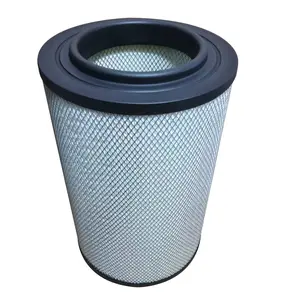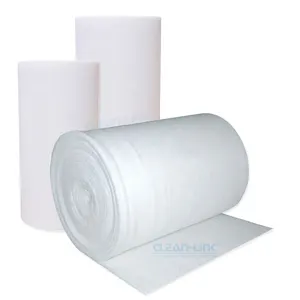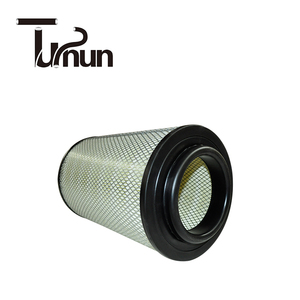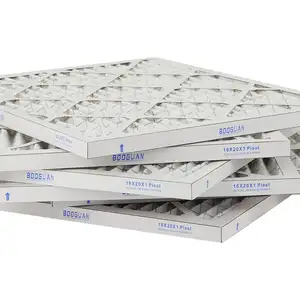An allergen air filter is an essential component in maintaining a clean and healthy indoor environment, especially for those suffering from allergies. These filters are designed to trap and remove a variety of airborne particles, including dust, pollen, pet dander, and other allergens that can trigger respiratory discomfort. Alibaba.com offers a diverse range of allergen air filters to cater to the varying needs of businesses seeking to improve air quality in their premises.
Types and Characteristics of Allergen Air Filters
Delving deeper into the types of allergen air filters, we find a spectrum of products each with unique characteristics. The MERV rating system is a standard measure of the effectiveness of air filters. Filters with higher MERV ratings can trap smaller particles, more effectively removing allergens from the air. For instance, products like the MERV 8 allergen air furnace filters are highly sought after for their balance of efficiency and cost-effectiveness. On the other end, HEPA filters, which stand for High-Efficiency Particulate Air filters, are the gold standard in air filtration, capable of trapping particles as small as 0.3 microns with 99.97% efficiency. These varying types cater to different levels of sensitivity to allergens and are crucial in environments from homes to high-demand industrial settings.
Structure and Operation of Allergen Air Filters
The physical structure of an allergen air filter is a marvel of engineering, designed to maximize air purification. A typical filter may include a pre-filter that captures larger particles, followed by a finer mesh that traps smaller allergens. The core of the filter is often a pleated media that increases surface area, allowing for greater capture of particles without impeding airflow. Advanced filters may also incorporate an activated carbon layer to adsorb odors and volatile organic compounds. The operation of these components in unison ensures a comprehensive approach to air purification, addressing a wide spectrum of air quality concerns.
Materials and Properties of Allergen Air Filters
The materials used in the construction of allergen air filters are chosen for their filtration properties and their ability to withstand airflow. Paper filters, often made from densely packed fibers, are effective for capturing particulates and are disposable, promoting hygiene and ease of maintenance. Plastic filters, on the other hand, may offer the advantage of being washable and reusable. The properties of these materials, such as their tensile strength and porosity, are critical in determining the filter's performance and longevity. The choice of material also impacts the filter's ability to resist moisture and microbial growth, ensuring the filter remains effective over time.
Business Usages and Applications of Allergen Air Filters
Allergen air filters find their applications across a multitude of business settings. In the hospitality industry, they ensure guest comfort by providing allergen-free rooms. Healthcare facilities rely on them to maintain sterile environments and prevent the spread of airborne diseases. Offices use these filters to enhance employee productivity by reducing allergen-related illnesses. The use of air purifiers for allergies in these settings not only creates business value by safeguarding health but also enhances the reputation of businesses as places that care for the well-being of their occupants.
Functions and Tasks of Allergen Air Filters
Allergen air filters are designed with specific functions in mind. They are tasked with the removal of fine particulate matter, which includes common allergens such as pollen, mold spores, and dust mite debris. In addition to these, filters with activated carbon can remove gases and odors, making them multifunctional. The ability to capture a wide range of contaminants makes these filters versatile tools in improving indoor air quality.
Features and Unique Selling Points of Allergen Air Filters
The distinct features of allergen air filters include their filtration efficiency, capacity to handle various particle sizes, and the inclusion of specialized layers for odor and gas absorption. Unique selling points such as low energy consumption, quiet operation, and smart sensor technology set some of the top rated air purifiers for allergies apart from their competitors. These features are particularly important for businesses that prioritize eco-friendliness and technological innovation.
Benefits and Positive Outcomes of Allergen Air Filters
The benefits of using allergen air filters are manifold. They significantly reduce the presence of airborne allergens, which can lead to a decrease in allergy symptoms and asthma attacks. This creates a more comfortable and productive environment, whether it be in a commercial setting or at home. The psychological comfort of knowing that the air is clean can also not be understated, contributing to overall well-being and peace of mind.
How to Use Allergen Air Filters Effectively
To use allergen air filters effectively, it is crucial to match the filter to the specific needs of the environment. This includes considering the size of the space, the type of allergens present, and the air change rate required. Installing the filter correctly, ensuring that it fits snugly without any gaps, is also vital to prevent unfiltered air from bypassing the filter. Regular monitoring of filter condition and timely replacement are key to maintaining optimal performance.
How to Choose the Right Allergen Air Filter
Choosing the right allergen air filter involves assessing the specific needs of the business or setting. Factors such as the type of allergens, the volume of air to be filtered, and the desired frequency of maintenance should all be considered. For businesses with a high presence of pet allergens, filters like the air purifier pet hair and air purifier for cat hair are designed to target these specific challenges. Understanding the MERV or HEPA rating system is also crucial in making an informed choice.
How to Clean and Maintain Allergen Air Filters
Cleaning and maintaining allergen air filters is essential for their continued effectiveness. For paper filters, this typically means regular replacement, as washing can damage their delicate structure. Plastic filters, however, can often be cleaned with water or vacuumed. It is important to follow the manufacturer's guidelines for cleaning to avoid damaging the filter. Regular checks for damage or wear are also important, as a compromised filter can lead to reduced air quality.
How to Install Allergen Air Filters
Installing allergen air filters is a straightforward process, but it must be done with care. Ensuring that the filter is the correct size for the air purifier or furnace is the first step. The filter should fit securely without any gaps that could allow unfiltered air to pass through. For businesses, it may be beneficial to seek professional installation to ensure that the filters are installed correctly and functioning at their best.
Target Audience and Meeting Needs with Allergen Air Filters
The target audience for allergen air filters is broad, encompassing anyone who values clean air. This includes households with allergy sufferers, pet owners, businesses that cater to sensitive populations, and industries where air quality is critical. Products like the air cleaner for allergies are tailored to meet the needs of these diverse groups, offering solutions that range from basic allergen removal to comprehensive air purification systems.
Alibaba.com provides a comprehensive selection of allergen air filters to meet the needs of businesses looking to enhance their indoor air quality. With detailed product descriptions and specifications, buyers can make informed decisions to find the best solutions for their air purification needs.










































 浙公网安备 33010002000092号
浙公网安备 33010002000092号 浙B2-20120091-4
浙B2-20120091-4